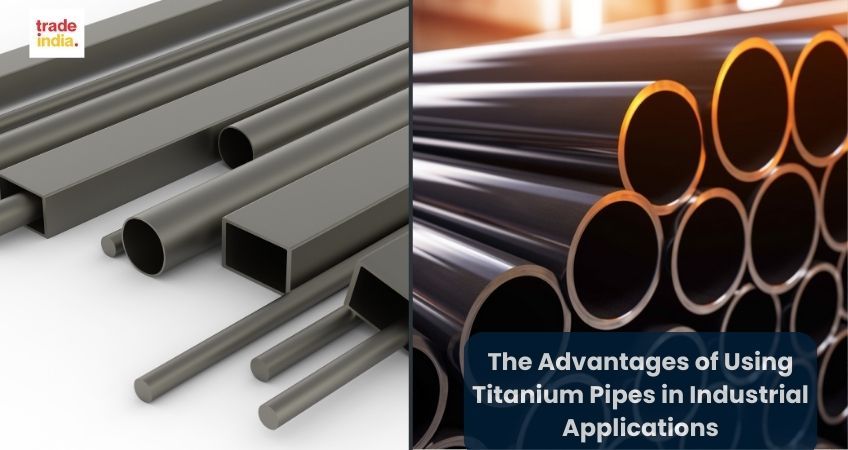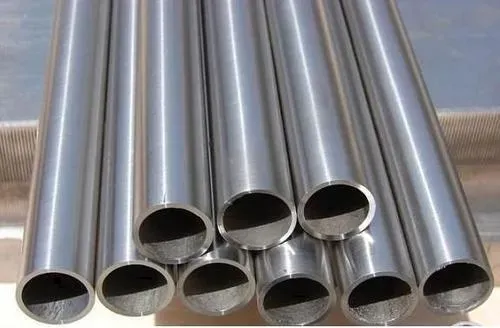
The efficiency and performance of Industrial applications most likely depend on the tools, equipment, and machines hired for a task. However, going into detail, the type of material used to develop them is also considered, making them suitable for that specific application. The same goes for the use of titanium pipes in industrial applications. The exclusive use of titanium pipes across major industries like aerospace, chemical processing, construction, and more, is due to its unique properties including superior corrosion resistance, high strength, low weight, durability, and more. To understand the significance of titanium pipes, let’s delve deep into this insightful article.
Key Advantages of Using Titanium Pipes
Superior Corrosion Resistance
Titanium is one of the most in-demand metals used across major industries, offering its unique properties like excellent corrosion resistance, durability, toughness, versatility, and long lifespan. Even when titanium is exposed to seawater or acids it sustains its integrity and quality. Industries that extensively source titanium pipes are chemical, automotive, aerospace, medical, military, desalination plants, etc.
High Strength-to-Weight Ratio
One of the most significant advantages of titanium is its high strength-to-weight ratio. Titanium pipes are as strong as steel but weigh about 45% less. This characteristic is particularly beneficial in industries such as aerospace and automotive, where reducing weight can lead to increased fuel efficiency and performance. Additionally, the reduced weight makes titanium pipes easier to handle and install, potentially lowering labor costs and installation time.
High Strength Low Weight Combination
Another significant benefit of using titanium pipes for industrial applications is that they have a high strength-to-weight ratio. In comparison to steel, the titanium pipes are much stronger but still weigh 45% less. Due to this, titanium pipes are essentially required in industries such as aerospace and automotive, for critical applications. In such industries reduced weight and increased strength results in fuel efficiency and high performance.
Longevity and Durability
Titanium pipes are most commonly hired as raw materials for manufacturing various mechanical tools and components because of their durability. These pipes can outlast other materials for several decades even with consistent usage in harsh environments. The reason behind their longevity is superior corrosion, wear, and chemical resistance properties. Businesses benefit significantly by investing in titanium pipes, in the long run, as they are considered reliable and the best long-term solution, saving replacement and maintenance costs.
High-Temperature Tolerance
Titanium metal has high-temperature tolerance due to which their pipes can withstand and perform very well during applications carried out in elevated temperatures. Such industries include aerospace and power plants, where the pipes are exposed to extreme heat during operations.
Biocompatibility
Titanium is biocompatible, meaning it is non-toxic for the human body, and does not negatively react with living tissues. Due to this advantage, industries such as food and beverage, pharma, medical device manufacturing, etc., extensively source titanium pipes for various applications. In these industries, contamination can cause serious problems, and these pipes ensure their products maintain their purity and integrity.
Reduced Maintenance Costs
The inherent properties of titanium, such as corrosion resistance and durability, translate into lower maintenance costs. Industries can save significant amounts of money on repairs, replacements, and downtime. The reduced need for maintenance also means that operations can run more smoothly and efficiently.
Versatility
Titanium pipes are incredibly versatile and can be utilized across a wide range of industries. In the oil and gas sector, they can withstand the harsh conditions of offshore drilling. In the automotive industry, they contribute to lighter and more fuel-efficient vehicles. Their adaptability makes them a valuable asset in numerous industrial applications.
Enhanced Flow Characteristics
The smooth internal surfaces of titanium pipes reduce friction, improving the flow efficiency of liquids and gasses. This reduced friction can lead to lower energy consumption in pumps and compressors, thereby reducing operational costs. Improved flow characteristics are particularly beneficial in applications such as water treatment plants and chemical processing facilities.
Resistance to Biofouling
In marine environments, biofouling—the accumulation of microorganisms, plants, algae, or animals on wet surfaces—can be a significant problem. Titanium’s resistance to biofouling makes it an excellent choice for marine applications, such as seawater piping systems and offshore structures. This resistance helps maintain the efficiency and longevity of the pipes.
Environmental Impact
Titanium is a sustainable material that can be recycled without losing its properties. This recyclability contributes to environmental conservation efforts, as it reduces the need for raw material extraction and minimizes waste. Using titanium pipes aligns with the growing emphasis on sustainable and environmentally friendly industrial practices.
Chemical Neutrality
Titanium is chemically neutral, meaning it does not react with most substances it comes into contact with. This neutrality is crucial for industries that handle reactive chemicals, ensuring that the pipes do not introduce contaminants or cause unwanted reactions.
High-Pressure Tolerance
Titanium pipes can withstand high pressures, making them suitable for high-pressure applications such as hydraulic systems and high-pressure gas pipelines. Their ability to maintain integrity under pressure ensures the safety and reliability of these systems.
Aesthetic Appeal
In addition to their functional benefits, titanium pipes have a sleek, modern appearance that can be advantageous in industries where aesthetics matter, such as architecture and interior design. Their attractive look, combined with their durability, makes them a popular choice for visible installations.
Applications of Titanium Pipes
Chemical Processing
Titanium pipes are ideal for transporting aggressive chemicals, acids, and other corrosive substances, as well as being used in heat exchangers for their ability to withstand high temperatures and corrosive environments.
Aerospace
In the aerospace industry, titanium pipes are used in aircraft hydraulic systems due to their high strength-to-weight ratio and resistance to corrosion. They are also utilized in aircraft exhaust systems for their high-temperature tolerance.
Marine
For marine applications, titanium pipes are perfect for seawater desalination plants due to their resistance to seawater corrosion. They are also used in offshore oil and gas platforms and subsea equipment due to their durability and resistance to biofouling.
Power Generation
In power generation, titanium pipes are used in nuclear power plant's cooling systems and other components exposed to corrosive environments and high temperatures. They are also suitable for handling geothermal fluids in geothermal plants, which are often highly corrosive.
Medical
Titanium’s biocompatibility makes it ideal for medical implants and surgical instruments. Additionally, in the pharmaceutical industry, titanium pipes are used to ensure purity and prevent contamination during the production and transport of pharmaceuticals.
Automotive
In the automotive industry, titanium pipes are used in high-performance and luxury vehicles' exhaust systems for their lightweight and heat-resistant properties. They are also utilized in turbocharger systems to withstand high temperatures and reduce weight.
Oil and Gas
Titanium pipes are essential in oil refining processes where resistance to high temperatures and corrosive substances is necessary. They are also used in pipeline systems for their strength and resistance to corrosion.
Industrial Manufacturing
Titanium pipes are used in heat exchangers and condensers in industrial equipment where high temperatures and corrosive environments are common. They are also suitable for chemical reactors dealing with highly reactive chemicals.
Architecture and Construction
In architecture and construction, titanium pipes are used as building materials for their aesthetic appeal and durability. They are also employed in structural components where strength and corrosion resistance are required.
Food and Beverage
Titanium pipes are used in food and beverage processing equipment to ensure hygiene and prevent contamination. They are also ideal for transporting food-grade products due to their non-toxic nature.
Water Treatment
In water treatment, titanium pipes are used in desalination plants for their resistance to seawater corrosion and in water purification facilities to ensure durability and reliability.
Sports Equipment
Titanium pipes are used in high-end bicycles and golf clubs for their lightweight and strong characteristics, as well as in various other sporting equipment to enhance performance and durability.
Electronics
Titanium pipes are used in cooling systems for electronic devices and data centers due to their excellent thermal conductivity and corrosion resistance. They are also employed in the production of electronic components where high purity and corrosion resistance are critical.
Explore More:







